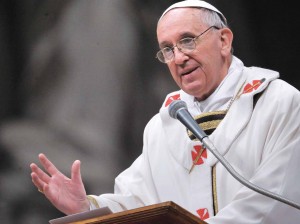 Pope Francis’s Wednesday General Audience on September 30 focused on his apostolic visit to Cuba and the United States. It was refreshing to hear the pope’s personal reflections on his visit, rather than the opinions of the media.
Pope Francis’s Wednesday General Audience on September 30 focused on his apostolic visit to Cuba and the United States. It was refreshing to hear the pope’s personal reflections on his visit, rather than the opinions of the media.
The pope reminded the faithful he had specifically timed his visit to coincided with the 8th World Meeting of Families, at Philadelphia. In addition, as a symbol of God’s desire to build bridges, he decided to visit Cuba first, before addressing the U.S. Congress in Washington or the main headquarters of the United Nations in New York. His goal during this visit, as a “Missionary of Mercy”, was two-fold: to build bridges and to encourage both those in authority as well as ordinary people to remain faithful to their religious roots.
In Cuba, the pope preached: “No more closure, no more exploitation of poverty, but freedom in dignity.” In his address on Wednesday, Pope Francis reiterated his challenge to the Cuban people to fulfill Saint John Paul II’s prophecy:
that Cuba open itself to the world and the world open to Cuba. No more closure, no more exploitation of poverty, but freedom in dignity. This is the way that makes the heart vibrate of many Cuban young people: not a way of evasion, of easy earnings, but of responsibility, of service to one’s neighbor, of care of fragility. A way that draws strength from the Christian roots of that people, which has suffered so much.
Once in the US, the pope focused on the need to build a society which is faithful to fundamental principles such as development and peace as well as care for the environment. Pope Francis did not condemn modern Americans but inspired them to remember their original dreams and ideals as he ”
recalled that the greatest richness of that country and of its people is in the spiritual and ethical patrimony. And thus I wished to encourage that social building be carried forward in fidelity to its fundamental principles, namely that all men are created equal by God and endowed with inalienable rights, such as life, freedom and the pursuit of happiness.
Pope Francis reiterated this same message where ever he went, to a wide spectrum of people from “political authorities, ordinary people, Bishops, priests and consecrated, (to) the poorest and the marginalized.”
The pope understands strong, Christian families are crucial to the health of society because they are the measure of our civilization. Modern rationalism holds man himself is the measure of all things. On the other hand, in this Audience, Pope Francis referred to “Biblical humanism” which looks back to Adam and Eve, the first family, as the measure of all things. Pope Francis explains how the family is the answer to the challenges the world faces:
The family, namely the fruitful bond between man and woman, is the answer to the great challenge of our world, which is a double challenge: fragmentation and massification, two extremes that coexist and sustain one another, and together they sustain the consumerist economic model. The family is the answer because it is the cell of a society that balances the personal and the communal dimension, and which at the same time can be the model of a sustainable management of the goods and resources of Creation.The family is the leading subject of an integral ecology, because it is the primary social subject, which contains within itself the two basic principles of human civilization on earth: the principle of communion and the principle of fecundity. Biblical humanism presents this icon to us: the human couple, united and fecund, placed by God in he garden of the world, to cultivate and protect it.
By defining the family unit as the economic measure of society, the pope is espousing Catholic social doctrine. Subsidiarity is one of the core principles which states that human affairs are best handled at the lowest possible level, closest to the people who are involved.
Pope Francis also warned against the danger of individualized consumerism, the hedonistic tendency for self-gratification, which creates a “throw-away culture.” The danger is that people will put careers or self-realization before marriage and starting a family. This trend will distort the needs of natural families and represents an “ideological colonization” which will disfavor most human families, especially the poor.
Pope Francis closed this Audience with an interesting insight and a challenge to the faithful. In the pope’s opinion, it was providential that the message and testimony of the World Meeting of Families took place at this time in the United States because America is a country which has reached “the highest economic and technical development without denying its religious roots. Now these roots themselves ask to begin again from the family to rethink and change the model of development, for the good of the entire human family.”



